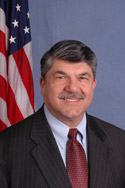Richard L. Trumka

On Sept. 16, 2009, Richard L. Trumka was elected president of the AFL-CIO by acclamation at the federation’s 26th Constitutional Convention in Pittsburgh. His election followed 14 years of service as Secretary-Treasurer of the AFL-CIO and built on his roots in the small coal mining communities of southwest Pennsylvania. He was elected the youngest Secretary-Treasurer in AFL-CIO history in 1995, as part of an insurgent campaign to reinvigorate the American labor movement. At the time of his election, Trumka was serving his third term as President of the United Mine Workers of America (UMWA).
Trumka led the creation of the AFL-CIO Capital Stewardship Program in 1997 to promote the retirement security of America’s working families. AFL-CIO member unions sponsor pension and benefit plans with more than $400 billion in assets and are a major force in the global capital markets. Under Trumka’s leadership, the AFL-CIO Capital Stewardship Program has promoted corporate governance reform, investment manager accountability, pro-worker investment strategies, international pension fund cooperation and trustee education and support.
As a member of the AFL-CIO Executive Council, Trumka was Chairman of the Strategic Approaches Committee, charged with assisting affiliated unions that seek assistance in achieving their strategic goals through collective bargaining. He also chaired the AFL-CIO Finance Committee and the AFL-CIO Capital Stewardship Committee, which works to ensure workers’ deferred wages are wisely invested to provide the best long-term benefits to America’s working families.
Trumka has been a key part of White House economic initiatives, starting in 1993, when President Clinton established the Bipartisan Commission on Entitlement and Tax Reform and nominated Mr. Trumka to be a member of the commission. Most recently, President Obama in 2009 named Trumka to the President's Economic Recovery Advisory Board, chaired by former Federal Reserve Chairman Paul A. Volcker.
A member of the AFL-CIO Executive Council since 1989, Trumka has been instrumental in developing tactics to rally the support of international labor on behalf of U.S. workers struggling for workplace justice against multinational conglomerates. He also served on the executive boards of the International Miners’ Federation and the International Confederation of Free Trade Unions (ICFTU) and played a key role in organizing a new global coalition of coal miners’ unions in five countries.
Trumka, a third-generation coal miner from Nemacolin, Penn., began working in the mines at age 19. As a member of UMWA Local 6290, he served as Chairman of the Safety Committee. He soon became an activist in the Miners for Democracy reform movement.
Trumka worked in the mines for more than seven years, supporting himself while attending Pennsylvania State University, where he graduated in 1971 with a Bachelor of Science degree, and through Villanova University, where he received a law degree in 1974. He served four years on the legal staff of the United Mine Workers during the reform administration of Arnold Miller before returning to the coal mines in 1979, while also conducting pro bono legal work for local families in the Nemacolin area during his hours away from the mine.
In his years working underground, the hazards of mining exposed Trumka to lifechanging lessons, experiences that shaped him far more than his academic or legal pursuits. Subsequently, he was elected to the union’s executive board in 1981 and first elected UMWA international president in 1982.
As President of UMWA, Trumka led the union in one of the most successful strikes in recent American history against the Pittston Coal Co., which tried to avoid paying into an industry-wide health and pension fund. This action resulted in significant advances in employer-employee cooperation and enhanced mine workers’ job security, pensions and benefits.
Because he consistently utilized non-violent civil disobedience throughout such strikes, in 1990 he received the Labor Responsibility Award from the Martin Luther King Jr. Center for Nonviolent Social Change.
Over time, his successes built upon one another. During his three-term UMWA presidency, Trumka won passage of the federal COAL Act that provides guaranteed health care for retired miners. He brought the UMWA back into the AFL-CIO; mobilized support to win a contract for 18,000 miners forced out on strike for 10 months by the Bituminous Coal Operators' Association; and established an office that rallied support among mine workers for the anti-apartheid movement in South Africa.
As the U.S. Shell Oil boycot chairman during this time, Trumka led the challenge against Shell for its business dealings in South Africa. Since 1995, he has served as President Emeritus of the United Mine Workers of America.
Among the many honors Trumka has received are the Gompers-Murray-Meany Award from the Massachusetts AFL-CIO. In 1996, he received the Jewish National Fund Tree of Life Award for his outstanding commitment to the American labor movement, to the nation and to the State of Israel. He also was honored by the Sons of Italy Foundation with its 2003 Humanitarian Award.
Trumka is committed to creating an economy that leaves no worker behind and a society that rewards hard work, and he has dedicated his life to actively fighting racism and prejudice in any form he encounters it. He has been a university lecturer on the economy, social change and workers' rights at Cornell University, the University of Illinois and others, and serves on numerous boards, including the National Labor College, Economic Policy Institute, ULLICO Inc., the Housing Investment Trust, the Solidarity Center, Alliance for Retired Americans and Union Privilege.
